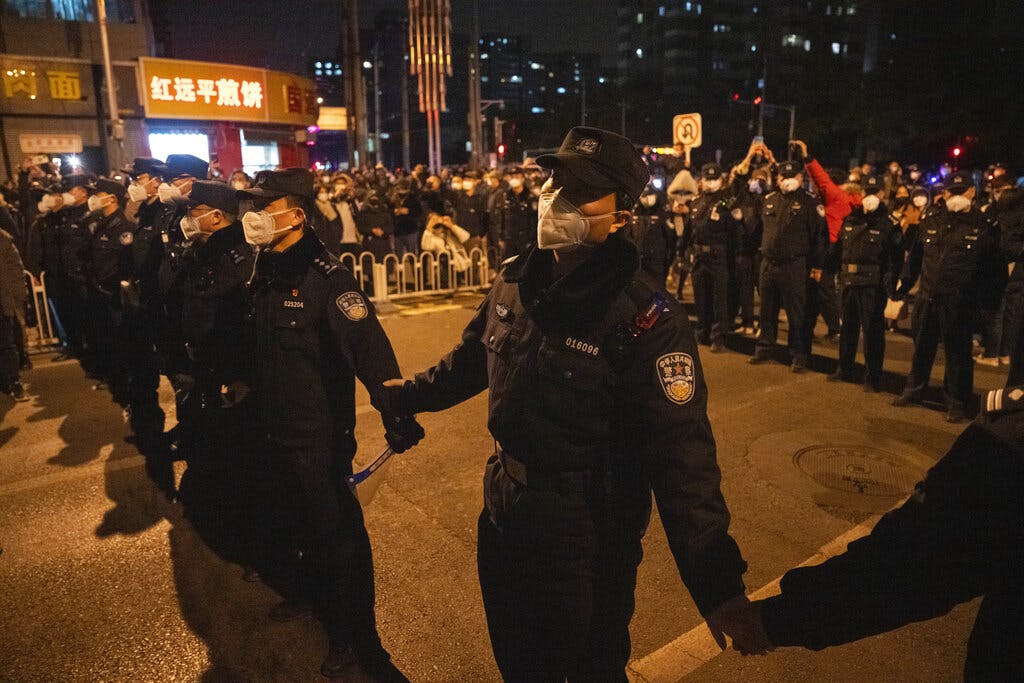China Protests, Evoking Memories of Tiananmen Square, Could Trim Xi’s Imperial Ambitions
North Korea’s communist regime, too, is likely on edge.

Protests breaking out in China against President Xi are telling the world he may not be quite so powerful as we’d been led to believe.
Just as he’s getting into his third term as leader of the Chinese Communist Party, through which he exercises authority, we’re now seeing images of crowds at Shanghai, Beijing, and other cities calling for him to step down.
Considering that China is a dictatorship, you have to admire the courage of the surging crowds. How long can they get away with it? That was the question I was asking at Tiananmen Square in May and June 1989 as crowds massed against the regime.
Was freedom breaking out at last? Deng Xiaoping was in charge, and he seemed almost liberal in comparison to the closed dictatorship of Mao Zedong, who had led his Red Army to victory 40 years earlier and ruled until his death in 1976.
It was not to be.
Deng, credited with destroying the “Gang of Four,” including Mao’s wife, had sought to perpetuate Mao’s legacy. He encouraged economic ties and adopted a pragmatic view toward capitalist enterprise in what had been a rigidly communist state.
It was Deng, however, who decided enough was enough, sent thousands of troops into Tiananmen Square, and repressed the uprising. More than 10,000 people died.
Against this background, you can’t really imagine the protests against Mr. Xi, the most powerful Chinese leader since Mao, are going to go on forever. It would be foolhardy to think they’ll even lead to reforms.
A dramatic power shift is not an option, but protest may still have some significant repercussions. You can bet North Korea’s state propaganda machine is suppressing news of what’s going on across the Yalu and Tumen River borders with China.
North Korea’s leader, Kim Jong-un, seen recently holding hands with his pre-teen daughter at the launch of his latest toy, a Hwasong-17 ICBM, should be quaking in his boots. Can he keep some of his poverty-stricken people from hearing the news?
Surely, it should filter in somehow. Well, maybe not. North Korea, under Mr. Kim’s grandfather, Kim Il-sung, was not affected right away by the fall of communist regimes between 1989 and 1991.
The demise of the Soviet Union did have a terrific impact when Moscow stopped accepting worthless North Korean funny money for all the industrial products, oil, natural gas, and food the former Soviet leaders had been pumping in.
More than two million North Koreans died of disease and famine in the 1990s, but they knew nothing about the fall of communist rule in their former Soviet benefactor. Times, however, have changed — at least a little.
Another kind of revolution — the rise of high-technology, mobile phones and broadcasts capable of penetrating ways to block them — should provide a clue as to what’s going on across the border.
China, the source of all North Korea’s oil and half its food, keeps North Korea on life support. With all that aid, news is likely to trickle in, too. Eventually. Yet unrest may have a much broader effect beyond China’s borders.
As unrest spreads, Mr. Xi is going to have to deploy police forces, and maybe elements of the People’s Liberation Army, before they seriously jeopardize his rule. By rights he should not have quite as much freedom to pursue ambitions of building a greater China with power extending from the Pacific to the Indian oceans.
One beneficiary should be Taiwan. Much as Mr. Xi might like to bully the renegade island province into submission to his rule, he should have enough sense to put that idea on hold.
It might be tempting to distract attention by staging military exercises around an island that’s but 100 miles away, but he’s done that. No one thinks he’s about to order an invasion.
The Chinese have been talking the talk about recovering Taiwan for decades. They’re not at all ready to walk the walk.
Mr. Xi might also want to downplay other ideas. He’s not about to declare the South China Sea, which China claims to own, as international waters, but the Chinese forces, on bases there, might be less aggressive.
They should stop telling American warships and planes to go away. Also, no more bullying the Philippines, Vietnam, and other claimants to rights in the sea. Not that Mr. Xi will sublimate his imperial aims.
First, however, he’s got to put out the fires at home. Pray there won’t be another Tiananmen.

